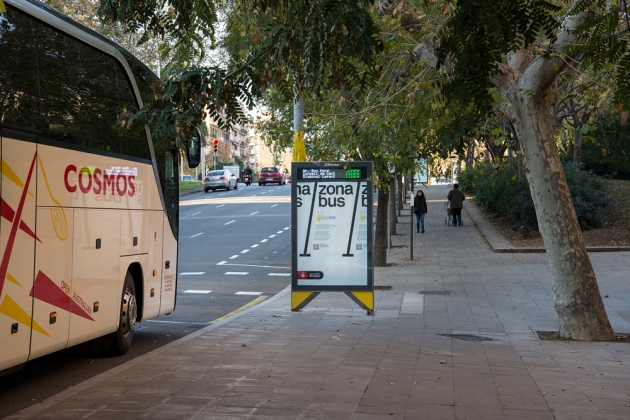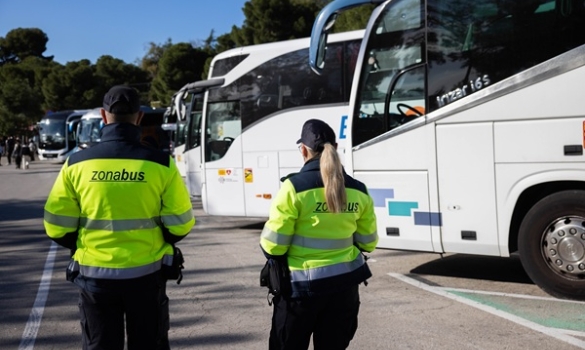

The Zona Bus 4.0 project, initiated by BSM, aims to create an intelligent monitoring system to optimise the presence of coaches in public spaces
The initiative has been allocated a budget of €1 million from the Tourism Sustainability Plan for Destination Barcelona, which is financed by the Next Generation European funds
Zona Bus 4.0 and SPRO are two of the sustainable mobility solutions being exhibited by BSM as part of the UITP‘s Global Public Transport Summit being held in Barcelona until 7 June
Barcelona de Serveis Municipals (BSM) is busy developing Zona Bus 4.0. The project's main goal is to create a smart system for monitoring the flow of tourist-coach traffic to encourage more efficient use of public spaces.
The initiative stems from the increasing use of the current Zona Bus, which is an exclusive system for tourist and private coaches, allowing these vehicles to circulate throughout the city. At present, private transport professionals have to register or reserve their stops and parking spaces through the SPRO mobile application. This generates a large volume of data which, when digitally processed, can be used to create an information system that helps to organise and even predict the flow and concentration of tourist coaches.
For example, it will be possible to determine the number of coaches visiting a certain tourist area during a specific timeslot. The project will also allow drivers to plan in advance, using relevant information to plan the route for the attractions they wish to visit.
The changes will also be visible in the coach parking and stopping areas, which will be digitalised and networked. Among other things, intelligent sensors and number-plate readers will be incorporated. Work is also being carried out to install digital screens that provide information of interest about the service for coach drivers and visitors alike. Among other resources, professionals will be able to consult available parking spaces and locations of other nearby parking areas, while tourists will be able to see the available public transport connections and the quickest route to the points of greatest interest.
For Laia Bonet, the acting Deputy Mayor and president of BSM, “this project is a clear example of the leadership that Barcelona wishes to achieve in the application of new technologies that improve mobility in the city. These measures have a positive effect, optimising public spaces, minimising unnecessary journeys and therefore favouring more organised mobility and reducing pollutant emissions”.
The development of Zona Bus 4.0, which has an allocated budget of €1 million and should become operational in 2025, is part of the Tourism Sustainability Plan for Destination Barcelona, which the City Council presented as a candidate for Europe‘s Next Generation funds. The plan is made up of a series of 19 projects intended to improve and diversify tourist offers and make progress in the energy transition and in the digitalisation of the sector.
Zona Bus, SPRO and Barcelona Nord, at the service of tourist mobility
The Zona Bus consists of a set of spaces reserved for tourist coaches to stop or park. They are always located close to spaces of high interest to the visiting public. Currently, there are 37 Zona Bus areas with a total of 168 spaces, 46 for short stops and 122 for parking.
The use of these exclusive parking and stopping areas for coaches allows more orderly access to these tourist attractions while improving traffic flow and the circulation of pedestrians in general.
Driving professionals record their stops and parking quickly and simply using the SPRO mobile application, created by BSM, and now considered a leading tool in the sector. After being operational for only one year, SPRO-BUS now has 4,052 active users and has managed to digitise 85% of its operations, relegating the use of parking meters to the remaining 15%. There were 49,382 operations in 2022. The first four months of 2023 have seen the number of registrations reach 33,627, six times the figure for the same period in 2022.
In addition to being launched in the Zona Bus, SPRO has been the benchmark app for professional drivers using the loading and unloading areas (DUM) since 2020. SPRO-DUM currently has 147,109 registered professionals and operates in 10 metropolitan municipalities: Barcelona, Badalona, Castelldefels, El Prat de Llobregat, Esplugues de Llobregat, l'Hospitalet de Llobregat, Sant Joan Despí, Sant Boi de Llobregat, Sant Just Desvern and Santa Coloma de Gramenet. In total, 2022 will register around 9.7 million operations.
The Estació d'Autobusos Barcelona Nord also plays an important role in the future management of tourist mobility in the city. The space is being transformed into a new tourist mobility hub. The idea is for Barcelona Nord to become the main hub for the arrival and departure of tourist coaches, thereby promoting cultural and local tourism and helping to make Barcelona a better organised and peaceful city through the decentralisation of tourist activity. The project is also integrated into the Barcelona Destination Tourist Sustainability Plan and boasts a budget of €4.8 million, provided by the Next Generation Fund.
BSM is featured at the UITP Global Public Transport Summit
The vision for Zona Bus is one of the projects that BSM is showcasing at the Global Public Transport Summit—the most important international meeting of the public transport and sustainable mobility sector, organised for the first time in Barcelona by the International Union of Public Transport (UITP). BSM will be taking part as an exhibitor with its own stand until 7 June, explaining how it is helping to promote new mobility in Barcelona through services such as Bicing, Endolla, the Aparcaments B:SM and technological applications such as SMOU and SPRO.
During the inauguration of the event, the BSM stand was visited by Raquel Sánchez, the Spanish Minister for Transport, Mobility and Urban Agenda; Juli Fernàndez, the Catalan Minister for Territorial Affairs; Khalid Alhogail, the president of the UITP; and Mohamed Mezghani, the Secretary General of the organisation. They were received by Laia Bonet, the president of BSM, and various BSM executives.
The UITP, of which BSM is a member, brings together 1,900 key stakeholders in the field of mobility, including public transport authorities, operators, research centres and service providers.
This is a project financed with funds from the Recovery, Transformation and Resilience Plan, financed by European Union – NextGenerationEU.

